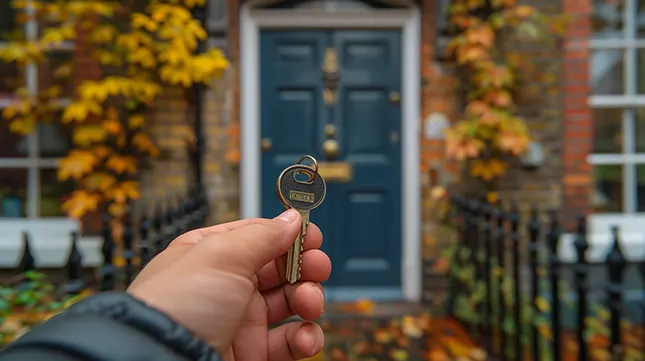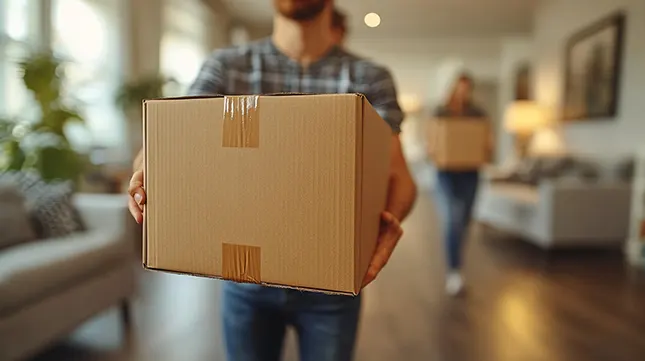Moving House Checklist: Your Comprehensive Guide to a Smooth Move

Moving to a new home is an exciting milestone, but without proper planning, it can quickly become overwhelming.
This is particularly so when you have lived in your current home for many years.
It seems like there is a huge mountain to climb before you move out.
From sorting through decades of belongings to coordinating logistics, the tasks can quickly pile up.
However, by breaking down the process and approaching it with a well-organised checklist, you can transform your move into a manageable and even enjoyable experience.
Careful preparation not only reduces stress levels but also ensures that nothing important slips through the cracks.
Our guide is designed to walk you through every step of your move, helping you stay organised and focused.
So, let’s get on with the task at hand and make your upcoming move as seamless as possible!
Create a “to-do” List

Making a to-do list is the best way to start preparing for your move.
Having a “to-do list” at hand at all times is a crucial tool when you are moving for numerous reasons:
- Your list allows you to prioritise tasks based on urgency and importance.
- With a clear outline of what needs to be done, you can allocate your time more efficiently.
- A to-do list breaks down the process into manageable steps. This reduces anxiety.
- If you’re moving with family or roommates, a to-do list makes it easier to delegate tasks.
- Your list ensures these smaller tasks aren’t overlooked.
- Include budget-related tasks such as obtaining quotes from moving companies or purchasing packing supplies to help you keep track of expenses and stay within your financial plan.
- You can tailor your to-do list to fit your specific needs, adding personal tasks that generic moving checklists might not include.
Ultimately, having a to-do list provides peace of mind and satisfaction.
There is nothing as satisfying as ticking off the jobs to be done as you complete each one.
It keeps you motivated and provides visual confirmation that you’re moving forward.
Start Early and Create a Timeline

Preparing for your move as early as possible will make the task far easier.
The key to a successful move is starting early.
Everything takes longer than you think it will!
Begin by setting an approximate moving date and work backwards to create a timeline of tasks.
Allocate specific weeks for sorting, packing, and administrative duties.
Early planning gives you ample time to handle unexpected issues without last-minute panic.
Declutter Your Home

Take some time to get rid of any items you no longer use.
Before you move to your new home, take the opportunity to declutter.
Go through each room and decide what to keep, donate, or discard.
This reduces the number of items you’ll move and keeps the costs to a minimum, as removal companies charge based on the volume of items they move.
Decluttering also helps you start fresh in your new home without dragging a mountain of belongings that you no longer need.
There are plenty of ways to dispose of the things you no longer need:
- Consider holding a garage sale
- Donate to local charities
- Take items to your recycling centre
- Advertise on platforms such as Ebay, Vinted or Gumtree
- Give away to friends and family
Notify Important Parties
An essential entry on your to-do list is all the organisations and individuals who need to know about your move.
When you start noting them down, you will be surprised at how many people need to know about your move.
Hence, start in good time before you move out.
Your list should include utility companies, banks, insurance providers, and subscription services.
Don’t forget to update your address with the postal service and arrange for your post to be re-directed.
Most of these notifications can be done online, saving you time and hassle.
Packing Supplies
This is particularly relevant if you are moving home yourself.
Gather all the necessary packing materials, such as boxes, tape, bubble wrap, labels and markers.
If you have a large number of boxes, consider investing in an automatic tape dispenser designed for sealing boxes.
They are inexpensive and really help make your work easier. You can purchase them for under £10 on Amazon.
Having the right supplies on hand makes the packing process more efficient.
Label each box with its contents and the room it belongs to, which will make unpacking much more straightforward.
Packing Up Non-Essential Items
If you are undertaking a DIY move, which does save money in certain circumstances, start by packing up your non-essential bits and pieces.
Your non-essentials may include seasonal clothing, ornaments, linen, books and toys.
Think about what you have stashed away in the loft. For most of us, the loft is a place to put things you probably won’t ever use again!
Clearly label the boxes with their contents, which will assist you when it is time to unpack.
If you are using a removal company for your move, an excellent choice for whole-house removals, you can still pack non-essentials.
However, remember not to seal the boxes so that the removal team can add their contents to the inventory!
Getting a head start with packing will help free up valuable time as move day draws near.
Prepare Several Essentials Boxes

Keep items you may need on moving day in an essentials box.
Having a few essential boxes ensures that your first few days in your new home are stress-free.
They should include the items that keep your daily routine intact, helping you settle in more quickly and saving you from digging through multiple boxes to find everyday necessities.
What to Include in Your Essentials Boxes
- Kitchen Necessities: Pack a few pots and pans, plates, bowls, mugs, cutlery, a can opener, and a kettle or coffee maker. Don’t forget dish soap, a sponge, and trash bags.
- Toiletries: Include toothbrushes, toothpaste, soap, shampoo, toilet paper, towels, and any personal hygiene products you use daily.
- Bedding and Clothing: Pack sheets, pillows, blankets, and a change of clothes for each family member. Consider the weather and pack accordingly.
- Medications and First Aid Kit: Keep prescription medications and a basic first aid kit handy for any minor emergencies.
- Essential Documents: Store passports, identification, financial documents, and moving paperwork in a secure folder within this box.
- Electronics and Chargers: Remember to bring phone chargers, laptop chargers, and any essential electronics you use regularly.
- Children’s and Pets’ Needs: Pack favourite toys, books, diapers, baby formula, pet food, leashes, and comfort items to help them adjust to the new environment.
- Essential Tools and Supplies: A small toolkit with a screwdriver, scissors, flashlight, batteries, and duct tape can be handy.
- Cleaning Supplies: Include wipes, paper towels, all-purpose cleaner, and hand soap to tidy up as needed.
- Snacks and Beverages: Non-perishable snacks and bottled water can keep everyone’s energy up during the move.
- Keep these boxes Separate: The best place is to store these in your car on move day so that the removal team doesn’t pack them by mistake.
By thoughtfully preparing your essentials box, you set yourself up for a smoother transition into your new home.
It’s a simple step that can significantly improve your moving experience.
It will allow you to focus on settling in and starting this chapter comfortably and quickly in your new home!
Arrange for Moving Services

Professional removals companies will make your move far easier.
This is another thing you can do before your move.
Arrange for several quotations for your house move.
Local removal companies generally don’t charge for visiting your home and carrying out a removal survey.
Whether you’re hiring professional movers or renting a truck, book these services well in advance.
There are times of the year when removal companies are particularly busy.
Summertime, over the school holidays, is one of the busiest times in the industry calendar and booking dates during this period can be difficult.
If you’re looking for reliable movers, White & Company offers comprehensive moving solutions for small and large moves.
Plus, White & Company have storage services, which come in handy if you don’t want absolutely all your belongings delivered in one day.
Take time to compare quotes and read reviews to find the best fit for your needs.
Essential Questions to Ask the Previous Homeowners

Take some time to ask the previous owners some questions about your new home.
Before you settle into your new home, it’s invaluable to have a conversation with the previous owners to gather essential insights.
Their firsthand knowledge can smooth your transition and help you acclimate more quickly to both the house and the neighbourhood.
Consider asking the following questions:
- Utility Locations: Where are the gas and electricity meters located?
- Waste Collection Schedule: What day are the bins collected, and are there any recycling protocols?
- Appliance Warranties: Are there existing warranties or service agreements on electrical items or appliances in the house?
- Climate Controls: Where is the thermostat situated, and are there any nuances to operating the heating or cooling systems?
- Water Shut-Off Valve: Where is the main water shut-off (stopcock) in case of an emergency?
- Internet Services: Which internet service providers are available in the area, and what has been their experience with them?
- Special Maintenance Needs: Are there items that require specific services or regular maintenance, like a septic tank or speciality heating system?
- Security Systems: Is there an existing security system, and how is it managed?
- Local Recommendations: Do they have preferred local services, such as a reliable plumber, electrician, or favourite grocery store?
- Community Insights: Are there any neighbourhood events or associations you should be aware of?
These questions are just a starting point.
Put together a personalised list that addresses your specific needs, perhaps a week before moving.
Your local and county council is another source of invaluable information when you first move to a new area.
Gathering this information can make daily life more convenient and help you avoid potential issues, ensuring a comfortable start at your new property.
Considerations for Moving with Children and Pets

Moving with children and/or pets can be tricky.
Moving can be particularly challenging for children and pets, as they often feel the impact of the change most deeply.
If you’re relocating to a new area, it’s essential to register your children at a new school that meets your standards well in advance to ensure a smooth educational transition.
For children staying at their current school, remember to inform the school administration of your new address.
To minimise stress on moving day, consider having your kids and pets stay with family or friends.
This keeps them safe and occupied while you handle the logistics.
For pets, booking a kennel or cattery for a day or two is also an option.
Don’t assume they’ll be on their best behaviour amid the chaos; temporary arrangements can provide a calmer environment until you’re settled.
If you’re moving abroad with pets, make sure they are fully vaccinated and that all necessary paperwork is completed before travel.
Proper preparation ensures a less stressful move for the entire family.
Clean Your Property Before Leaving

Make sure you leave your old home in good condition.
Leaving your old home in a clean and tidy state is both considerate and beneficial.
The condition you leave it in reflects on you and can significantly impact the new occupants’ first impressions.
If you’re a renter, cleaning before moving out is often a legal requirement specified in your lease agreement.
Neglecting this duty can result in penalties such as losing your security deposit or facing additional charges.
It’s essential to consult your landlord to understand your obligations fully.
They may provide a checklist or highlight specific areas that need attention, like carpets, appliances, or windows.
Even if you’re selling your home, a thorough cleaning can facilitate a smoother handover and leave a positive impression on the buyers.
If time or resources are limited, hiring a professional cleaning service can be a wise investment.
Professionals have the expertise to ensure the property meets all necessary standards, saving you time and potential disputes.
Ultimately, leaving your old home spotless not only fulfils your responsibilities but also provides a respectful closure as you move on to your new residence.
Final Few Things to Do Before Leaving
Before leaving your old home for the last time, it’s crucial to conduct a thorough final walkthrough to ensure everything is in order.
Please review your ” to-do list” to confirm that you have completed all the tasks you set out to do on moving day.
Make sure you’ve notified everyone who needs your new address, from utility companies to friends and family.
Double-check your transportation plans and consider having a backup route in case of unexpected delays.
Remember, moving can be stressful, so try to remain patient and flexible.
Equally important is taking meter readings of your electricity, gas, and other utilities on the day you move out.
Inform your suppliers immediately to prevent any disagreements over your final bills. Keep a record of these readings for your files.
When you arrive at your new home, take meter readings there as well to ensure you’re only billed from the day you move in.
This proactive approach can save you from future billing issues and provide peace of mind during your transition.
Preparing Your New Home Before Moving In

Follow these steps to make sure your new home is ready to move into.
Before you settle into your new residence, it’s crucial to ensure that your new home is fully prepared for your arrival.
Start by scheduling professional cleaning services to make the space pristine, especially if the previous occupants have just moved out or if the property has been unoccupied.
Setting up essential utilities like electricity, gas, water, heating, and internet in advance will prevent any inconvenient delays or service gaps.
Conduct a comprehensive walkthrough of the property to identify any maintenance issues that need attention, such as leaky faucets, malfunctioning appliances, or security concerns like faulty locks.
Addressing these problems before moving day can save you time and stress.
If you have children, researching and registering them at local schools should be a top priority.
Utilise resources like GreatSchools and Snobe to compare educational institutions in your new area and find the best fit for your family’s needs.
Don’t forget to explore extracurricular activities and community programs that can help your children adjust to their new environment.
Additionally, familiarise yourself with the neighbourhood by locating nearby amenities such as grocery stores, healthcare facilities, parks, and public transportation options.
This preparation will not only make your move smoother but also help your family feel more at home from the very beginning.
Moving Day Has Arrived

There are several things to do on the day of the move itself.
On the day of your move, start by confirming the arrival time of your moving company if you have already done so.
Double-check that your “essential” boxes are safely stashed so they cannot be accidentally packed.
Keep a separate bag or box with essential items and important documents that you’ll transport yourself.
Before leaving, check for any forgotten items, ensure all windows and doors are locked, and lights are turned off.
Provide clear instructions to the movers about fragile or high-priority items.
Keep your phone charged and have important contacts readily available.
Say your goodbyes, and lastly, make sure all keys are handed over as agreed, including those for windows!
Setting up in the New Home

It’s time to settle into your new home.
Moving out of your old home took planning and patience; the same applies when you move into the new one.
Almost everything has to be done again but in reverse!
Find the Best Energy Tariffs
When settling into your new home, it’s the perfect time to reassess your energy options.
Research and compare energy suppliers available in your area to find the most competitive tariffs that match your consumption habits.
Switching from your previous provider is entirely acceptable, especially if another company offers better rates or additional benefits.
Utilise comparison websites like Uswitch or Compare the Market to easily evaluate different plans.
Once you’ve chosen a supplier, provide them with the necessary details about your energy usage to secure the most suitable tariff.
Don’t forget to lodge the meter readings you took on your move-in day with your new supplier.
This ensures you’re only billed for the energy you use from the day you take ownership.
Evaluate Your Council Tax Band

Check your council tax band is correct to avoid any nasty surprises.
It’s essential to make sure that your new property is in the correct council tax band.
Since 1991, over 100,000 homes in the UK have been incorrectly banded, leading some homeowners to overpay.
Here’s how you can check:
- Compare with Neighbours: Speak with neighbours who have similar properties to find out what council tax band they’re in and how much they pay. This can give you a benchmark for comparison.
- Assess Property Value in 1991: Council tax bands are based on property values from 1991. Use the Nationwide House Price Calculator to estimate what your home would have been worth then.
- Gather Evidence: Ensure you have solid evidence before challenging your council tax band. This includes your property’s estimated 1991 value and comparisons with neighbouring homes.
If discrepancies arise, you can appeal to the Valuation Office Agency (VOA) in England and Wales or the Scottish Assessors Association in Scotland to have your band reassessed.
Register to Vote
Updating your address on the electoral roll is a crucial step after moving.
Registering to vote not only allows you to participate in elections but also positively impacts your credit score, as financial institutions use the electoral roll to verify identities.
Each eligible person in your household should register individually.
The process is quick and can be done online via the UK Government’s Register to Vote service.
Ensure all registrations are completed promptly to maintain your voting rights and credit standing.
Handle Previous Occupant’s Mail

Make sure all the mail you receive is going to the right place.
It’s common to receive mail addressed to former residents.
If you know their new address, you can forward the mail to them.
If not, simply write “Return to Sender—Not at This Address” on the envelope and place it in a postbox.
This notifies the sender of the change, prompting them to update their records and reducing future misdirected mail.
Consider Getting Boiler Cover
If your new home features a gas or electric boiler, getting boiler breakdown cover is a wise precaution.
Unexpected boiler issues can be costly, especially during the colder months.
Boiler insurance typically covers repairs for the boiler itself, central heating, plumbing, and sometimes drainage systems.
Homeowners can explore options from providers like British Gas or HomeServe.
Always read the policy details to understand what’s included.
For renters, boiler maintenance is usually the landlord’s responsibility.
Ensure this is specified in your tenancy agreement and report any issues promptly to avoid disruptions.
Explore Free Loft Insulation Schemes
Effective loft and cavity wall insulation can significantly reduce your annual energy bills—sometimes by over £500.
Many energy companies offer free or subsidised insulation schemes to eligible homeowners as part of government initiatives to improve energy efficiency.
Investigate programs like the Energy Company Obligation (ECO) to see if you qualify.
Proper insulation not only lowers costs but also enhances your home’s comfort by maintaining consistent temperatures.
Generate Income from Renting Spare Rooms

You may want to consider renting out a spare room.
If you have extra space and could do with a little extra money each month, renting out a spare room can be a lucrative way to supplement your income.
Under the UK’s Rent a Room Scheme, homeowners can earn up to £7,500 per year tax-free from letting furnished accommodation in their homes.
Before proceeding, notify your mortgage lender and check any terms that may affect your ability to rent out a room.
Additionally, update your home insurance to reflect this change.
For those who prefer flexibility, platforms like Airbnb allow you to host guests on a short-term basis, providing an opportunity to earn income without a long-term commitment.
Renters should exercise caution, as subletting is often prohibited in tenancy agreements.
Always obtain written permission from your landlord before considering this option.
In Conclusion

It is no wonder that many compare moving home to losing a loved one or going through a divorce.
It is a hotbed of uncertainty, worry, and stress, so it is perfectly natural to feel both excitement and anxiety.
However, once the dust has settled, it is also an opportunity to reset your life and start afresh.
By taking each step one at a time, sticking to your to-do list, and staying organised, you’ll soon settle into the comfort of your new space.
Don’t hesitate to seek help when you need it!
Support from friends, family, or professionals can make all the difference.
Remember, no move is perfect, but by following our comprehensive moving house checklist, we sincerely hope that you can make the process smoother and more enjoyable.
Good luck in your new home!
Arrange Your Free, No-Obligation Survey

As part of our professional removals service, we offer a completely free, no-obligation survey.
Our approachable surveyors can either visit your home in person or arrange a video call to assess your specific moving requirements.
You’ll receive a detailed quote, and we’ll be on hand to answer any questions you might have.
Ready to make your next move a smooth one?
Give us a call or complete our Quick Quote Form online, and a member of our team will contact you to get you started.
Moving doesn’t need to be stressful.
With a reliable removals company at your side, you can focus on the exciting new chapter ahead.
Wherever life is taking you next, let White & Company do the heavy lifting so you can settle into your new home as quickly as possible.

Max is a seasoned writer and blogger in the real estate and home moving sectors, as well as a knowledgeable source of information for expatriates living and working abroad. His detailed insights have helped thousands of people move and live abroad with greater simplicity and ease.
Posted in: News
Leave a Comment (0) ↓




